
Dirty Weekend is a British film directed by Michael Winner, based on the 1991 novel of the same name by Helen Zahavi. It was banned from video release for two years by the BBFC for its violent and sexual content.

The L-Shaped Room is a 1962 British drama romance film directed by Bryan Forbes, based on the 1960 novel of the same name by Lynne Reid Banks. It tells the story of Jane Fosset, a young French woman, unmarried and pregnant, who moves into a cheap London boarding house, befriending a young man, Toby, in the building. The work is considered part of the kitchen sink realism school of British drama. The film reflected a trend in British films of greater frankness about sex and displays a sympathetic treatment of outsiders "unmarried mothers, lesbian or black" as well as a "largely natural and non-judgmental handling of their problems". As director, Forbes represents "a more romantic, wistful type of realism" than that of Tony Richardson or Lindsay Anderson.

Ice Cold in Alex is a 1958 British war film set during the Western Desert campaign of World War II based on the novel of the same name by Christopher Landon. Directed by J. Lee Thompson and starring John Mills, the film was a prizewinner at the 8th Berlin International Film Festival. Under the title Desert Attack, a shortened, 79-minute version of the film was released in the United States in 1961. Film critic Craig Butler later referred to the shortened versions as nonsensical.
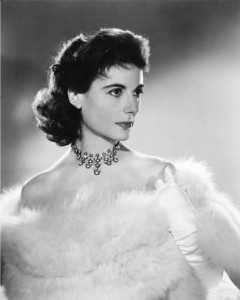
Yvonne Mitchell was an English actress and author. After beginning her acting career in theatre, Mitchell progressed to films in the late 1940s. Her roles include Julia in the 1954 BBC adaptation of George Orwell's novel Nineteen Eighty-Four. She retired from acting in 1977.

Oh... Rosalinda!! is a 1955 British musical comedy film by the British director-writer team of Michael Powell and Emeric Pressburger. The film stars Michael Redgrave, Mel Ferrer, Anthony Quayle, Ludmilla Tchérina and Anton Walbrook and features Anneliese Rothenberger and Dennis Price.

John Lee Thompson was a British film director, active in London and Hollywood, best known for award-winning films such as Woman in a Dressing Gown, Ice Cold in Alex and The Guns of Navarone along with popular and cult pictures like Cape Fear, Conquest of the Planet of the Apes, Battle for the Planet of the Apes and The White Buffalo.

Sylvia May Laura Syms was an English stage and screen actress. Her best-known film roles include My Teenage Daughter (1956), Woman in a Dressing Gown (1957), for which she was nominated for a BAFTA Award, Ice Cold in Alex (1958), No Trees in the Street (1959), Victim (1961), and The Tamarind Seed (1974).
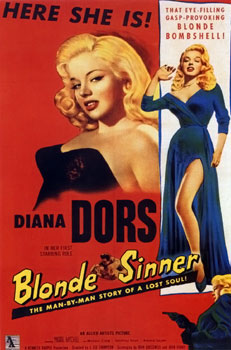
Yield to the Night is a 1956 British crime drama film directed by J. Lee Thompson and starring Diana Dors. The film is based on the 1954 novel of the same name by Joan Henry. The storyline bears a superficial and coincidental resemblance to the Ruth Ellis case, which had occurred the previous year but subsequent to the release of Henry's novel. The film received much positive critical attention, particularly for the unexpectedly skilled acting of Dors, who had previously been cast solely as a British version of the typical "blonde bombshell". The movie was nominated for the Palme d'Or at the 1956 Cannes Film Festival.

A Kind of Loving is a 1962 British kitchen sink drama film directed by John Schlesinger, starring Alan Bates and June Ritchie. It is based on the 1960 novel of the same name by Stan Barstow which was later adapted into the 1982 television series A Kind of Loving. The film tells the story of two lovers in early 1960s Lancashire. It belongs to the British New Wave movement.

Bitter Harvest is a 1963 British kitchen sink drama film directed by Peter Graham Scott and starring Janet Munro and John Stride.

Up the Junction is a 1968 British "kitchen sink" drama film, directed by Peter Collinson and starring Dennis Waterman, Suzy Kendall, Adrienne Posta, Maureen Lipman and Liz Fraser. It is based on the 1963 book of the same name by Nell Dunn and was adapted by Roger Smith. The soundtrack was by Manfred Mann. The film followed Ken Loach's BBC TV adaptation of 1965, but returned to the original book. It generated less controversy and impact than the Loach version.
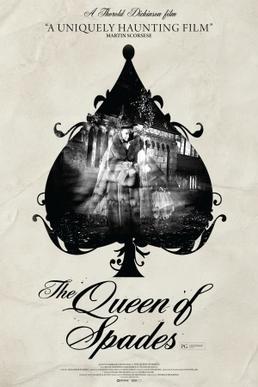
The Queen of Spades is a 1949 British fantasy-horror film directed by Thorold Dickinson and starring Anton Walbrook, Edith Evans and Yvonne Mitchell. It is based on the 1834 short story of the same name by Alexander Pushkin.

They Drive by Night is a 1938 British black-and-white crime thriller film directed by Arthur B. Woods and starring Emlyn Williams as Shorty, an ex-con, and Ernest Thesiger as Walter Hoover, an ex-schoolmaster. It was produced by Warner Bros. - First National Productions and based on the 1938 novel They Drive by Night by James Curtis.
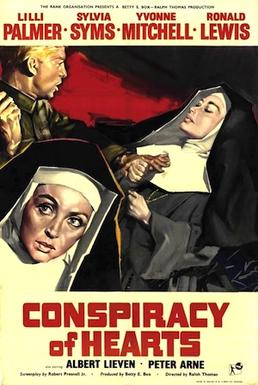
Conspiracy of Hearts is a 1960 British Second World War film, directed by Ralph Thomas, about nuns in Italy smuggling Jewish children out of an internment camp near their convent to save them from The Holocaust. It stars Lilli Palmer, Sylvia Syms, Yvonne Mitchell and Ronald Lewis, and was nominated for a Golden Globe for Best Film Promoting International Understanding at the 18th Golden Globe Awards in 1961.

All The Way Up is a 1970 British comedy film directed by James MacTaggart and starring Warren Mitchell, Pat Heywood, Kenneth Cranham, Richard Briers, Adrienne Posta and Elaine Taylor. It is based on the 1962 play Semi-Detached by David Turner.
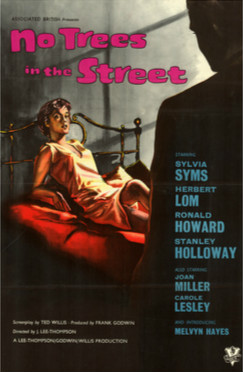
No Trees in the Street is a 1959 British crime thriller directed by J. Lee Thompson and starring Sylvia Syms, Herbert Lom and Melvyn Hayes. It was written by Ted Willis, from his 1948 stage play of the same name.

The 7th annual Berlin International Film Festival was held from 21 June to 2 July 1957. The International Federation of Film Critics awarded FIPRESCI Award for the first time this year. The Golden Bear was awarded to the American film 12 Angry Men directed by Sidney Lumet.

No Time for Tears is a 1957 British drama film directed by Cyril Frankel in CinemaScope and Eastman Color and starring Anna Neagle, George Baker, Sylvia Syms and Anthony Quayle. The staff at a children's hospital struggle with their workload.
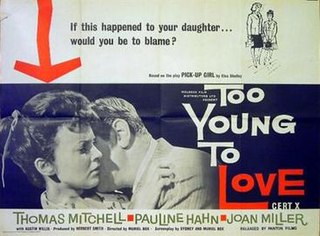
Too Young to Love is a 1959 British drama film set in New York. It was directed by Muriel Box and starring Pauline Hahn, Joan Miller, and Austin Willis. It was based on the play Pickup Girl by Elsa Shelley. An adaptation of the story was broadcast on British TV on 6 December 1957 in the ITV Television Playhouse series.
Frank Godwin was an English film producer, best known for the film Woman in a Dressing Gown.


















